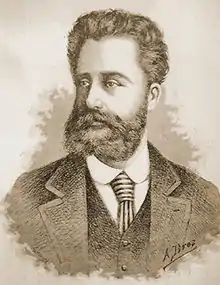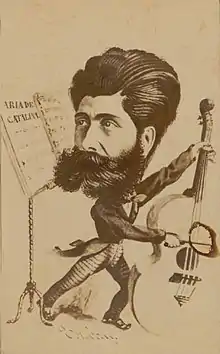Joaquín Gaztambide
Joaquín Romualdo Gaztambide y Garbayo (Tudela, Navarre, 7 February 1822 – Madrid, 18 March 1870) was one of the most prominent Spanish composers of zarzuela in the mid-nineteenth century. His contribution to the revival of the genre was highly significant; and although during the last century his work virtually disappeared from the Spanish musical scene, the early 21st century has reversed this trend. Of Italianate quality in the manner of Gaetano Donizetti, his music nonetheless makes use of Spanish rhythms and dance forms. Among other renowned works (many in opéra comique form), his La Mensajera (1849), El valle de Andorra (1851), El sueño de una noche de verano, Catalina (1854), Los magiares (1857), El juramento (1858), and the one-act classic Una vieja (1860) stand out.

Biography

Sent to Pamplona by his uncle to study piano and composition with Joseph Guelbenzu and Mariano Garcia,[1] Gaztambide taught piano and played bass in the orchestra of a theater to make his living. He then moved to Madrid in 1842, where he studied at the Real Conservatório de Musica Maria Cristina,[1] later continuing his studies of piano with Pedro Albéniz and composition with Ramon Carnicer.[2]
In 1845, he became choirmaster of the Italian Company of Teatro de la Cruz with the help of his friend Francisco Salas.[3] Two years later he traveled to Paris as conductor of a company of actors and dancers organized by the Spanish businessman Juan Lombía,[3] despite not being successful in this tour. Back in Madrid in 1848, he receives a proposal from Baltasar Saldoni to become director of the orchestra at Teatro Español,[2] where he conducted concerts with the participation of the famous violinist Antonio Bazzini.[4]
In 1850, along with Rafael Hernando Palomar and Francisco Asenjo Barbieri, he directed the orchestra at Teatro Variedades,[2] co-founding the Sociedad Artística Musical the following year to exploit the activities of Teatro del Circo as composer and conductor.[4] In 1856, he entered another partnership in Barbieri's company of the newly opened Teatro de la Zarzuela in Madrid,[5] for which he also became composer and conductor. From 1860 until 1862 he directed opera performances and the first big concerts in Spain, organized by the Sociedad Artístico Musical de Socorros Mutuos, co-founded by Francisco Asenjo Barbieri and Fernando Mosnasterio del Castillo on 24 June 1860.[4]
On 19 December 1863, his La conquista de Madrid premiere at the Teatro de la Zarzuela, with libretto by Luis Mariano de Larra.[6] In 1865, he was hired as conductor for the Teatro de los Campos Eliseos, in Madrid, in one of the first performances of the music of Richard Wagner.[1] In 1868, he was appointed director and chairman of the Sociedad de Conciertos de Madrid, where the opera Tannhäuser premiered.[7] The same year he toured Cuba with his own company and flew to Mexico because of a major revolt,[8] returning to Spain in 1870 with serious health problems and financially ruined.[8] He died as a result of severe liver disease shortly after arriving to Madrid.[8]
Zarzuelas (selective list)
Gaztambide composed 44 zarzuelas.[9]
| No. | Original title | English title | Acts | Librettist | Theater | First perf. |
|---|---|---|---|---|---|---|
| 01 | La mensajera | The Message Girl | 2 | Luis de Olona | Español | 1849-12-24 |
| 06 | Al amánecer | At the Dawn | 1 | Mariano Pina Bohigas | Circo | 1851-05-08 |
| 07 | Tribulaciones | Tribulations | 2 | Tomás Rodríguez Rubí | Circo | 1851-09-14 |
| 08 | Por seguir a una mujer[10] | In Pursuit of a Woman | 4 | Luis de Olona | Circo | 1851-12-24 |
| 09 | El sueño de una noche de verano | A Midsummer Night's Dream | 3 | Patricio de la Escosura | Circo | 1852-02-21 |
| 10 | El estreno de una artista | The Premiere of a Performer | 1 | Ventura de la Vega | Teatro del Circo | 1852-06-05 |
| 12 | El valle de Andorra | The Valley of Andorra | 3 | Luis de Olona | Circo | 1852-11-05 |
| 18 | Catalina | Catalina | 3 | Luis de Olona | Circo | 1854-10-23 |
| 25 | Los magiares | The Hungarians | 4 | Luis de Olona | Zarzuela | 1857-04-12 |
| 28 | Un pleito | 1 | Francisco Camprodón | Zarzuela | 1858-06-22 | |
| 29 | El juramento | The Oath | 3 | Luis de Olona | Zarzuela | 1858-12-20 |
| 32 | Una vieja | An Old Lady | 1 | Francisco Camprodón | Zarzuela | 1860-12-11/14 |
| 41 | La conquista de Madrid | 3 | Luis de Olona | Zarzuela | 1863-12-23 |
See also
References
- Roger Alier, Roger Alier Aixalà (1982). El Libro de la zarzuela. Daimon. p. 160. ISBN 8423126773. (in Spanish)
- J. Cincotta, Vincent (2002). Zarzuela: The Spanish Lyric Theatre : a Complete Reference. University of Wollongong Press. pp. 33–189. ISBN 0864187009.
- María Luz González Peña, Emilio Casares (1999). Faura-Guataca. S.G.A.E. p. 554. ISBN 8480483083. (in Spanish)
- Casares, Emilio (1994). Francisco Asenjo Barbieri, Volume 2. Editorial Complutense. pp. 22–253. ISBN 8480480661. (in Spanish)
- Rhodes Draaye, Suzanne (2009). Art Song Composers of Spain: An Encyclopedia. Scarecrow Press. p. 112. ISBN 978-0810863620.
- Gutiérrez Nájera, Manuel (1959). Periodismo y literatura, artículos y ensayos, 1877-1894. UNAM. p. 149. ISBN 9683695426. (in Spanish)
- Peña y Goñi, Antoni (1967). España, desde la ópera a la zarzuela. Medrid: Alianza Editoria. p. 134. OCLC 479715. (in Spanish)
- Webber, Christopher (2002). The Zarzuela Companion. Scarecrow Press. p. 110. ISBN 1461673909.
- Robert Ignatius Letellier (19 October 2015). Operetta: A Sourcebook, Volume II. Cambridge Scholars Publishing. p. 794. ISBN 978-1-4438-8508-9.
- Collaboration with Hernando, Barbieri, Oudrid and Inzenga